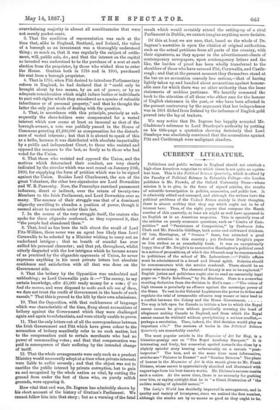CURRENT LITERATURE.
Politicians and public writers in England should not overlook a high-class American magazine to which there is not quite an equiva- Politicians and public writers in England should not overlook a high-class American magazine to which there is not quite an equiva-
lent here. This is the Political Science Quarterly, which is edited by
the Faculty of Political Science in Columbia College—the London publisher is Mr. Frowde, of the Oxford University Press—whose mission it is to give, in the form of signed articles, tho results
of scientific investigation in politics, economics, and public law. It is admirably edited and arranged, and although the writers have the political problems of the United States mainly in their thoughts, there is almost nothing that they say which ought not to be of interest here. Thus, of the eight papers that compose the March number of this quarterly, at least six might as well have appeared in an English as in an American magazine. This is specially tree of the articles on purely economic questions, such as "Limits of Cora. petition" and "Persistence of Competition," by Professor John Clark and Mr. Franklin Giddings, both acute and cultivated thinkers. Of late, Harrington, of " °canna " fame, has attracted a good deal of attention in this country ; yet Professor Dwight's paper on him strikes us as remarkably fresh. It was an exceptionally happy idea of Mr. Dwight's to summarise Harrington's political creed in a series of propositions, of which the fifteenth may be recommended to politicians of the school of Mr. Labonehere :—"Publio affairs must be administered in a broad and liberal spirit. Salaries should be commensurate with the service rendered. There should be no penny-wise economy. The element of beauty is not to he neglected." English jurists and politicians ought also to rend an essentially legal paper on " Riel's Rebellions," by Dr. Bimbaut. Here is a somewhat startling deduction from the decision in Riel's case :--" The crime of high treason is peculiarly an offence against the sovereign power of the State. To vest in the Colonial Legislature the power to define and regulate the trial of treasonable offences may sooner or later lead to a conflict between the Colony and the Home Government The way is left open for Canada to initiate a law to which the Royal assent cannot be given without practically severing the bond of allegiance uniting Canada to England, and from which the Royal assent cannot be withheld without precipitating a serious conflict,— perhaps a revolution. Theo, indeed, the Riel decision would play an important r6le." The reviews of books in the Political Science Quarterly are remarkably careful.


































 Previous page
Previous page